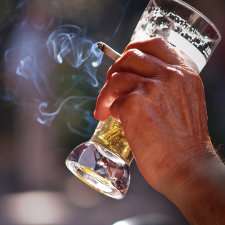Consumption of nicotine in adolescence may lead to increased alcohol intake later in life

Researchers have long known that there is a link between nicotine and alcohol consumption. But the nature of the connection—how long it lasts, which begets which—remains a mystery.
A new Tel Aviv University study finds that nicotine exposure during adolescence can predict increased alcohol intake in adulthood. This suggests that memories of smoking tobacco as a teenager alter the brain's reaction to alcohol even after a prolonged nicotine withdrawal. The research indicates that these nicotine "memories" may even lead to a tendency toward heavier drinking later in life.
The research was led by Dr. Segev Barak and his research team at TAU's School of Psychological Sciences and Sagol School of Neuroscience. It was published in Scientific Reports.
The influence of memory
"Previously, it was believed that the mere consumption of nicotine during adolescence could trigger the use of other drugs—cocaine, heroin and alcohol," Dr. Barak said. "Our study shows that nicotine 'memories' from adolescence are the culprit, not the nicotine itself."
The researchers found that nicotine "memories" caused long-lasting changes in the brain, long after the cessation of nicotine consumption. A brief exposure to the nicotine environment triggered a robust decrease in the expression of the growth factor GDNF in the brain's pleasure center. "We have previously shown that GDNF serves as a brain regulator of alcohol consumption," Dr. Barak said. "We assume that this drop in GDNF following the retrieval of nicotine memories leads to loss of control, thus boosting drinking."
The researchers used rat models to test the link between nicotine and alcohol consumption. To study the effects on alcohol consumption, the researchers installed an experimental self-serve alcohol dispenser, operated by a lever press. When placed in this "bar," rats were free to consume unlimited amounts of alcohol.
Group 1 received nicotine during adolescence in Chamber B, and then drank alcohol in adulthood in Chamber A—in other words, drinking alcohol in an environment different to that in which they used nicotine. Conversely, Group 2 received nicotine during adolescence in Chamber A, and then in adulthood drank alcohol in the same chamber (that is, in the nicotine-associated environment), triggering a reminder of the nicotine experience.
"The rats eagerly drink alcohol," said Yossi Sadot-Sogrin, who contributed to the research. "During the daily one-hour sessions, most of them consumed the amount of alcohol equivalent to a glass or two of wine."
But when the self-serve alcohol dispenser was installed in the same chamber in which rats received nicotine during their adolescence, the amount of alcohol consumed rose sharply.
"In the nicotine-associated environment, rats drank the amount of alcohol that corresponded to four glasses of wine, and even more," said Koral Goltseker, who collaborated on the study.
The team is currently researching the specific changes to the brain caused by nicotine memories. "If we can prevent these brain changes, we hope we can prevent the long-term increase in alcohol consumption," said Dr. Barak. "It will also teach us a lot about the brain mechanisms that lead to alcoholism."
More information: Dor Zipori et al. Re-exposure to nicotine-associated context from adolescence enhances alcohol intake in adulthood, Scientific Reports (2017). DOI: 10.1038/s41598-017-02177-2


















